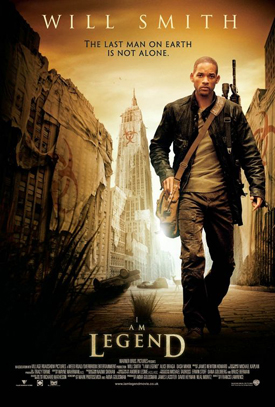 There’s an implied standard when reviewing a film that you should only review what’s on the screen. Not what’s in your head, not what could have been, not the cut that might end up on DVD. It’s a worthy ideal, if futile and, to some extent, counter-productive. One beauty of film is what it suggests, the ideas and possibilities that come to mind while watching and days later. What’s on the screen is just the beginning, especially for great films.
There’s an implied standard when reviewing a film that you should only review what’s on the screen. Not what’s in your head, not what could have been, not the cut that might end up on DVD. It’s a worthy ideal, if futile and, to some extent, counter-productive. One beauty of film is what it suggests, the ideas and possibilities that come to mind while watching and days later. What’s on the screen is just the beginning, especially for great films.
I Am Legend is not at all a great film, monster, post-apocalyptic or otherwise. But it does put me in a frustrating position by forcing me to review both the film that’s on screen and the one that might have been had the filmmakers chosen to hew closely to Richard Matheson’s book. Actually, to hell with ‘closely’. ‘Vaguely’ would do.
Credited screenwriters Akiva Goldsman and Mark Protosevich, with director Francis Lawrence, have jettisoned a major part of Richard Matheson’s original text. In the novel, viral apocalypse survivor Robert Neville spends much of his time hunting the mutated, monstrous remains of humanity only to discover that his prey isn’t as mindless as originally suspected. In fact, these creatures consider Neville to be their own all too real boogeyman. Neville’s realization of this fact and the actions that follow are part of an elegant and memorable turnaround. That crucial perspective shift is completely missing from this movie.
I won’t tell you what the new ending is, not that it really matters. Point is, being familiar with the source, I spent most of the second half of I Am Legend waiting for a reveal that never came. The character who should become Neville’s link between humanity and creature-dom is just a regular person. The title, creepily resonant when applied to the tale’s original conception, is given new context. It’s also shamelessly referenced by Neville’s newfound love for Bob Marley’s album ‘Legend’, which is a distracting, stupid detail I’m ready to blame on Goldsman.
So, all that established, what is I Am Legend? As a follow-up to Francis Lawrence’s surprisingly effective Constantine, it’s a toothless snooze. Goldsman and Lawrence retain enough of Matheson’s text that the moody, downbeat flick plods along as Neville navigates his ruined city (in this case, Manhattan) looking for survivors and attempting to concoct a cure for the virus that destroyed humanity. The film tentatively explores Neville’s lonely madness and the paranoia the last man on Earth might experience, but never dives in to it head first.
Lawrence presents Will Smith as Neville in poses that vacillate from improbably muscular and fit to aging and almost broken. If I felt like Smith’s external appearance was truly meant to mirror his internal disintegration I’d be more willing to accept that inconsistency. For his part, Smith is actually quite good from scene to scene, and finally dodges the youthful appearance that has frequently undercut his attempts to project gravitas and maturity.
As the only human for most of the (rather short) running time, Smith has got to carry this movie, and his efforts are good enough to do so. Those of Goldsman and Lawrence are not.
Smith is allotted a poor set of antagonists. The film is populated by shrieking viral zombies that move with lightning speed, but their agility and ferocity is damaged by Lawrence’s reliance on CGI. Though Neville’s first on-screen encounter with the ‘survivors’ is tremendously suspenseful (I love seeing a clump of pseudo-zombies standing like transfixed clut members) elsewhere the monsters are just rubbery CGI stand-ins. I don’t mind that Mike Patton’s trademark howls emit from the creatures, but hate that Lawrence chose to crank the volume every time it happens. Fear and aural pain are not equal.
And while the film’s last act goes off in a whole new direction (I’d say unique, but that would be pretending that 28 Days Later… and other recent zombie movies don’t exist) the creative team did keep a smart zombie around as a sort of lightning rod antagonist for Neville. A showdown between the two characters looms but never really materializes, and the film is (yet again) inconsistent in portraying the zombie’s intelligence, as when he seems to set a trap for Neville for no easily discernable reason.
The character feels like a vestigal limb from a time when the script was more like Matheson’s story. Misdirection is wonderful when it is composed and purposeful, but this feels like an example of lazy filmmaking, as if someone at Warners wanted to retain an identifiable villain in a film that was obviously a too-moody character piece.
I admire elements of this flick, primarily the depiction of an abandoned, overgrown Manhattan. It’s as affecting a sight as Danny Boyle’s empty London. But, in combination with fast zombies, the new ending and overall tone, that also invites comparisons to 28 Days Later… that the movie can’t survive. I Am Legend is a movie afraid to be itself, and by refusing to establish a unique identity it turns out to be almost nothing at all.